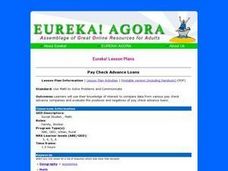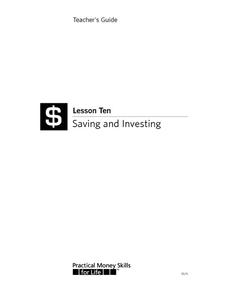Visa
Nothing But Net: Understanding Your Take Home Pay
Introduce your young adults to the important understanding that the money they receive from their paychecks is a net amount as a result of deductions from taxes. Other topics covered include federal, state, Medicare and social security...
Curated OER
Pay Check Advance Loan
Learners research loans. In this financial lesson plan, students explore the benefits and drawbacks of applying for a pay-day advance loan. Learners compare different programs and calculate interest owed. Multiple resources are provided.
Curated OER
Reading A Pay Stub
Students complete the included activity sheet related to reading a pay stub and calculating deductions. Once the activity sheet has been checked, students demonstrate their knowledge of the vocabulary associated with the lesson through...
Curated OER
Understanding Your Pay and Paycheck
Learners discuss as a class, the time delay between the end of a pay period and a person's paycheck. They discuss the difference between gross pay and net pay, and identify the different figures on the sample checks or the check stubs...
Curated OER
Reading A Pay Stub For Paryroll Deductions
Students identify and explain the various payroll deductions that are taken to pay for a variety of government services and company benefits. This lesson is intended for students acquiring English.
Curated OER
Unit 4: Money Management - Using Bank Services
Young scholars explore information about banking and banking services. They practice filling out deposits and withdrawal slips, transferring money and discover how money is transferred when making purchases. Students identify types of...
Curated OER
Pay Check Advance Loans
Students explore the implications of obtaining loans. They assess interest rates, amount to be paid back, and the implications if they do not pay back the loan on time. Students develop a comparison chart.
WindWise Education
When is a Wind Farm a Good Investment?
When will a wind farm pay for itself? Individuals calculate the anticipated annual revenue for two proposed wind farms. By comparing the number of years it takes to pay back the initial investment, they determine which site makes the...
EngageNY
Grade 9 ELA Module 2, Unit 2, Lesson 7
The accusations begin in Sophocles' Oedipus the King, with troublemakers and enemies abound. As learners delve deeply into the sights unseen, they review textual evidence from their readings to write about the importance of timing in the...
Visa
A Plan for the Future: Making a Budget
From fixed and variable expenses to gross income and net pay, break down the key terms of budgeting with your young adults and help them develop their own plans for spending and saving.
Visa
Living On Your Own
Learners gain a realistic understanding of what is required for independent living. They begin by setting up a budget based on needs and lifestyle, and then use worksheets and a presentation to practice such skills as reading a rental...
National Endowment for the Humanities
George Washington: The Precedent President
Everyone knows that George Washington was the first president, but do your scholars know why that was so important? The lesson plan, the third in a sequence of three, allows learners to understand how George Washington set a precedent...
Curated OER
Running Out of Time: Vocabulary Strategies
Review concepts and terms after reading Running Out of Time. Learners each come up with a few terms that they think are important and then participate in a list-group-label exercise, paying close attention to the two main years featured...
Illustrative Mathematics
Kendall's Vase - Tax
Practice sales tax when using the activity with three solution choices. Learners can use a percent table, benchmark percent, or solve by calculating. Solutions don't show how to multiply by the decimal, but method can be added in. Great...
Curated OER
Roll of Thunder, Hear My Cry: Chapter 10
In this Roll of Thunder, Hear My Cry comprehension check worksheet, students respond to 20 short answer questions pertaining to chapter 10 of the Mildred D. Taylor novel to better understand the novel and the author's craft.
Curated OER
The First Part Last: Part One
In this The First Part Last comprehension check worksheet, students respond to 25 short answer questions pertaining to part 1 of the Angela Johnson novel to better understand the novel and the author's craft.
Curated OER
Pay Credit When Credit is Due
Students explore the concept of credit. In this credit lesson, students examine student organizers that focus on credit scores and credit history. Students participate in an on-line activity. Students examine credit card offers and...
Visa
Saving and Investing
Impress upon your young adults the importance of saving and investing, and give them a foundational vocabulary from which they can continue to build their financial literacy. This lesson plan covers short- and long-term budget goals,...
Curated OER
How much money can you earn?
Fifth graders survey how to manage money and the importance of it. Students summarize that each day they have the opportunity to earn or lose money. Students provides many situations to present ways of paying bills and money management.
Curated OER
Taxes
Fourth graders read Stone Fax and explore earning money, saving, credit and taxes. In this taxes lesson, 4th graders complete a worksheet to develop understanding of paying off debts, keeping a checkbook, calculating sales tax and...
Curated OER
The Real Tooth Fairy
First graders listen to the story "The Real Tooth Fairy and explore the concept of mental images. In this mental image lesson plan, 1st graders create a mental image of what the tooth fairy looks like. Students listen to the teacher...
Heritage Foundation
Congress's Economic Powers
Join Congress as they assess their economic abilities for spending—and as they discover their limits. High schoolers use an educational resource to explore Congress's economic powers and learn to apply these concepts to their everyday...
Practical Money Skills
Living on Your Own
Independent living can be fun, but also overwhelming if you don't know how to budget your income and expenses. Go over the ways that kids can manage their money as they take a huge step into adulthood with a project-based lesson about...
Practical Money Skills
Saving and Investing
Learn the difference between saving money and investing money, as well as the advantages and disadvantages of each. Kids review banking and personal finance terms before studying the different ways that people can reach their financial...

























